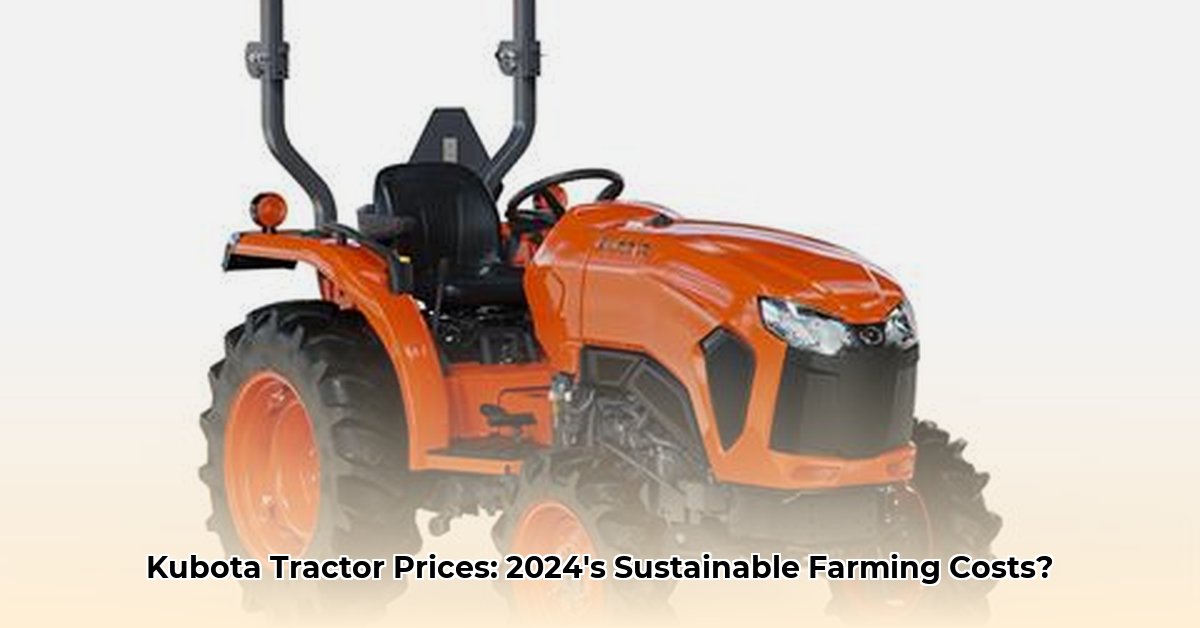
Understanding Kubota Tractor Pricing: A Comprehensive Guide
Buying a Kubota tractor is a significant investment for any sustainable farming operation. This guide provides a detailed breakdown of Kubota tractor costs, helping you choose the right model for your needs and budget. The price depends heavily on several factors, making a thorough understanding crucial before making a purchase. Will a higher upfront cost be offset by long-term savings? Let's explore. For more detailed pricing information, check out this helpful resource: Kubota Tractor Costs.
Decoding Kubota Tractor Prices: Factors Influencing Cost
The cost of a Kubota tractor varies significantly, ranging from approximately $5,200 for compact models to well over $100,000 for high-horsepower machines. Several key factors influence the final price:
Horsepower (HP): This is a primary driver of cost. A 20 HP tractor will be substantially cheaper than a 55 HP model. Horsepower directly correlates to engine power and the amount of work the tractor can perform.
Features: Additional features like advanced transmissions, specialized power take-offs (PTOs – the mechanism powering attachments), and precision farming technologies increase the price. Basic models with essential features are typically more affordable.
Model Series: Kubota offers different model series (e.g., L4508, NeoStar), each designed for specific tasks and farming scales. Higher-end series often incorporate advanced features and command higher prices.
Dealer and Location: Retail prices can vary depending on location and individual dealerships.
Here's a general price overview, emphasizing that these are estimates and actual prices can vary:
| Model Category | Horsepower Range | Estimated Price Range (USD) |
|---|---|---|
| Compact Tractors | 20-30 HP | $5,200 - $10,000 |
| Mid-Size Tractors | 30-40 HP | $10,000 - $15,000 |
| Large/High-HP Tractors | 40-55+ HP | $15,000 - $100,000+ |
Finding the Right Kubota Tractor for Your Sustainable Farm: A Step-by-Step Guide
Choosing the optimal Kubota tractor involves more than just the price. It’s about finding the best fit for your specific farming operation and sustainability goals. Follow these steps:
Step 1: Assess Your Farming Needs
Before you start browsing models, carefully analyze your farm’s requirements:
- Crop type: Different crops need different implements and tractor capabilities.
- Acreage: The size of your farm dictates the necessary horsepower and capabilities.
- Tasks: Identify the specific tasks (plowing, tilling, planting, harvesting, etc.) the tractor must perform.
Step 2: Compare Kubota Tractor Models
Once you've assessed your needs, compare Kubota models carefully. Consider:
Fuel Efficiency: Fuel costs represent a significant portion of the total cost of ownership (TCO). Prioritize models with high fuel efficiency to minimize your environmental impact and operational expenses.
Compact Design: Smaller, compact tractors minimize soil compaction, crucial for soil health and sustainable farming practices.
Precision Farming Compatibility: Compatibility with GPS guidance and auto-steer systems can optimize farming practices, increasing efficiency and yields.
Step 3: Calculate the Total Cost of Ownership (TCO)
The initial purchase price is just one aspect of the overall cost. Calculate the TCO by considering:
- Purchase Price: The initial investment.
- Fuel Costs: Projected fuel consumption based on your anticipated workload and the tractor's fuel efficiency.
- Maintenance: Budget for routine maintenance, repairs, and potential parts replacements.
- Resale Value: Consider the potential resale value at the end of the tractor's lifespan.
A higher initial purchase price for a more fuel-efficient and durable model might lead to lower long-term costs.
Step 4: Explore Financing Options
Kubota and other financial institutions offer various financing options. Exploring these options could make the purchase more financially manageable.
Evaluating Sustainability in Kubota Tractors: Addressing the Data Gap
While fuel efficiency is a key factor in sustainable farming, comprehensive lifecycle assessments (LCAs) for Kubota tractors are limited. This hinders direct comparisons of the environmental impact across different models. We encourage greater transparency from manufacturers regarding:
- Manufacturing emissions: Greenhouse gas emissions during the manufacturing process are often overlooked.
- End-of-life recyclability: The recyclability of tractor components at the end of their life is a vital aspect of sustainability.
Despite the data limitations, choosing a fuel-efficient model with a smaller engine and considering the long-term cost remain important steps towards sustainable farming practices.
Model Comparison Example
The following is a sample comparison, keeping in mind the lack of comprehensive LCA data. Prices and fuel efficiency are estimates and will vary.
| Kubota Tractor Model (Example) | Horsepower | Approximate Price Range (USD) | Estimated Fuel Efficiency (Gallons/Hour - Approximate) |
|---|---|---|---|
| L4508 | 45 | $25,000 - $35,000 | 2-3 |
| M5-111 | 111 | $70,000 - $90,000 | 4-6 |
| M7-171 | 171 | $120,000 - $150,000 | 6-8 |
Note: Prices are estimates and can vary based on dealer, configuration, and year.